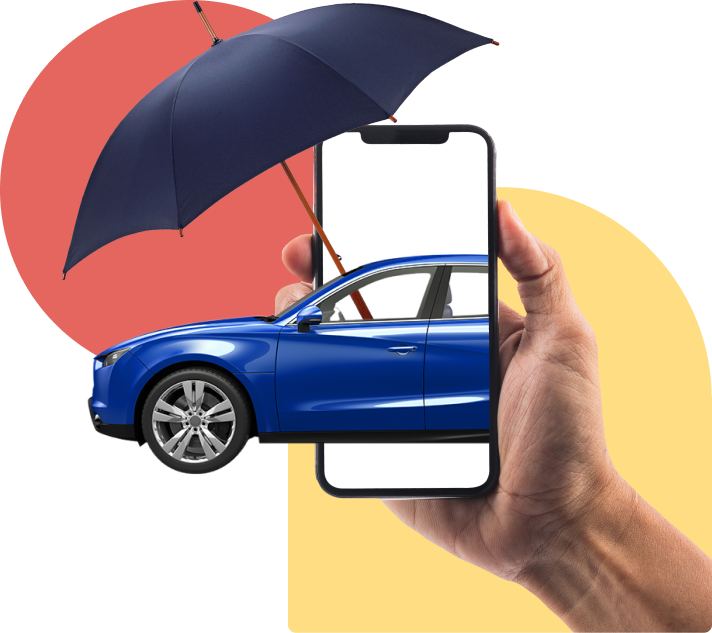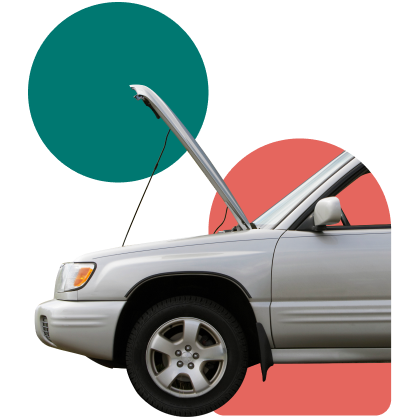Car Insurance
Comparing online car insurance quotes can help you narrow down carriers with auto insurance rates that fit your budget and coverage needs. But with so many options to sort through, knowing where to start can be tough. Bankrate's insurance editorial team mapped out four steps to help you discover what coverage you may need and how to find it at the best price:

Determine your priorities
Insurance is a highly individualized product, and every driver has different needs to meet in terms of both coverage and budget. Are you willing to spend a little more for top-notch customer service, or is price the primary determining factor? Does your vehicle need special coverage, or are you looking for a standard policy with improved perks like discounts and the latest digital tools? Setting a budget and outlining your priorities will simplify the shopping process.

Build your desired coverage package
Once you know how much you can spend, you can evaluate the different types of coverage and policy limits you may need and request the same package from each company. Requesting auto insurance quotes that are as similar as possible in terms of coverage types and limits allows you to compare rates from different carriers accurately.
Gather your personal information
Anonymous car insurance quotes exist, but they’re rare and often inaccurate. To compare accurate rates, you will need to have some information handy, including:
-
Driver information
You will need to provide basic information (such as names and birthdays) for all the drivers in your household. While you probably won't need their driver's license numbers during the quoting process, you will need them to purchase the policy and may want to gather this information now to make it easier to purchase the policy later. Additionally, the company may run your credit-based insurance score if you live in a state that allows insurance companies to consider your credit history as part of calculating your car insurance rate.
-
Vehicle information
Providing your vehicle identification number (VIN) when requesting a quote allows insurers to estimate the risk and cost of claims on your car and can help ensure that you receive all the vehicle safety discounts you may be eligible for.
-
Driving history
It's vital to give a detailed account of the accidents, tickets and suspensions you and any other drivers on your policy have received over the last three to 10 years. Because most companies don't run driving records until you decide to purchase the policy, failure to provide this information during the process could result in inaccurate quotes that change significantly when you finalize your policy.
Estimate your car insurance quote
Factoring in the criteria listed above, our auto insurance quotes calculator can give you a general range of what you can expect to pay for car insurance. The estimated range can be useful to refer back to when you begin to compare car insurance quotes.
Calculate your monthly car insurance payment
Get a quick estimate to make sure you're not overpaying.
Your estimate awaits...
Answer a few questions to reveal your payment

The results are in...
Your estimated payment
Ready for real rates?
Crunching the numbers...
An error occurred...
We're unable to estimate your payment

Ready for real rates?
Powered by Coverage.com (NPN: 19966249)
Coverage.com, LLC is a licensed insurance producer (NPN: 19966249). Coverage.com services are only available in states where it is licensed. Coverage.com may not offer insurance coverage in all states or scenarios. All insurance products are governed by the terms in the applicable insurance policy, and all related decisions (such as approval for coverage, premiums, commissions and fees) and policy obligations are the sole responsibility of the underwriting insurer. The information on this site does not modify any insurance policy terms in any way.
After you’ve gathered enough auto insurance quotes, you can start comparing them based on your priorities, budget and preferred coverage package. All insurance companies weigh risk factors and formulate insurance premiums differently. Your policy quotes will range in price based on how each carrier weighs certain rating factors.
Get a quote from car insurance companies in
Pros
Cons
Powered by Coverage.com (NPN: 19966249)
Coverage.com, LLC is a licensed insurance producer (NPN: 19966249). Coverage.com services are only available in states where it is licensed. Coverage.com may not offer insurance coverage in all states or scenarios. All insurance products are governed by the terms in the applicable insurance policy, and all related decisions (such as approval for coverage, premiums, commissions and fees) and policy obligations are the sole responsibility of the underwriting insurer. The information on this site does not modify any insurance policy terms in any way.
We couldn't find any rates that match your critera
Please check your inputs and try again, or answer a few more questions to get accurate, personalized quotes from carriers in your area.
Powered by Coverage.com (NPN: 19966249)
Coverage.com, LLC is a licensed insurance producer (NPN: 19966249). Coverage.com services are only available in states where it is licensed. Coverage.com may not offer insurance coverage in all states or scenarios. All insurance products are governed by the terms in the applicable insurance policy, and all related decisions (such as approval for coverage, premiums, commissions and fees) and policy obligations are the sole responsibility of the underwriting insurer. The information on this site does not modify any insurance policy terms in any way.
Why should you use Bankrate to compare auto insurance quotes?
As a trusted name in the financial services sector since 1976, Bankrate began as a print publication geared toward bankers and those in the banking industry. Today, we help millions of readers make wise decisions regarding their savings, loans, investments and insurance. Our insurance editorial team includes licensed agents with agency experience. Using our combined knowledge and proprietary rate data, we can provide accurate, helpful and easy-to-understand information to help you find the cheapest online car insurance quotes.
With Bankrate, you can:
- Rest assured that we safeguard your private information
- Instantly compare personalized rates among many of the nation's top car insurance companies
- Purchase a policy with a licensed agent through our coverage agency
- Research auto, home and life insurance through articles written, edited and reviewed by industry professionals
What can affect my car insurance quote?
Car insurance is like a fingerprint — car insurance companies may use almost a dozen different rating factors to determine your premium. Although these factors can vary depending on your state, some may include your age, gender, location, driving history and credit history. Additionally, the type of vehicle you drive and the level of coverage you select will impact the cost of your car insurance. With this in mind, the best car insurance quote will be different for everyone. The best way to find the cheapest policy that suits your individualized needs is to request free online car insurance quotes and shop around.


Your age and gender
In most states, the age and gender of a driver may play an important role in determining car insurance rates. Demographic groups that are shown to engage in riskier driving behaviors, such as young drivers, male drivers and senior drivers, typically face higher rates on average.



Bankrate Awards

The best in auto insurance for 2024
Our Bankrate Awards identified the standout insurers across a range of metrics. In our search for the best of the best, we analyzed average rates, coverage offerings, discounts, availability, digital tools, and third-party customer satisfaction and financial strength ratings.
Featured car insurance reviews
Bankrate Rating = 4.4/5
Bankrate scores are objectively determined by our editorial team. Our scoring formula weighs several factors consumers should consider when choosing financial products and services.
Bankrate Rating = 4.3/5
Bankrate scores are objectively determined by our editorial team. Our scoring formula weighs several factors consumers should consider when choosing financial products and services.

Bankrate Rating = 3.1/5
Bankrate scores are objectively determined by our editorial team. Our scoring formula weighs several factors consumers should consider when choosing financial products and services.

All Bankrate insurance reviews
Comparing insurance companies can help you find the right policy for your lifestyle. Bankrate's company reviews can help you determine if a carrier fits your needs. Our reviews look at more than just price, so you walk away with a robust view of each insurance provider.
Car Insurance Basics
Latest Articles
-

State Farm Steer Clear review: what you need to know
If you’re a State Farm customer, learn how Steer Clear helps your teen drive safely.
10 min read Apr 25, 2024 -

What is a car insurance deductible?
Bankrate explains what car insurance deductibles are and how they work.
12 min read Apr 25, 2024 -

What to do after a hit and run in New Jersey
Involved in a hit and run in New Jersey? Bankrate explains what to do next.
6 min read Apr 25, 2024 -

Factors that impact your cost of car insurance
Understanding insurance rating factors can help you get cheaper car insurance.
12 min read Apr 25, 2024 -

How a speeding ticket impacts your insurance in Minnesota
A Minnesota speeding ticket may raise auto insurance rates by 23 percent or more.
6 min read Apr 25, 2024 -

Car insurance after a hit-and-run in West Virginia
Involved in a hit-and-run accident in West Virginia? Here’s what to do next.
7 min read Apr 25, 2024 -

Texas car insurance laws: What you need to know to drive legally
Texas law requires all drivers to carry a minimum level of auto coverage.
6 min read Apr 24, 2024 -

Low-income car insurance in Michigan
Michigan drivers may have options for finding low-cost car insurance
7 min read Apr 24, 2024 -

Financial independence for young adults: establishing your own insurance
Insurance is a key component of financial independence. Bankrate explains.
10 min read Apr 24, 2024 -

What is a policyholder for insurance: What you need to know
Want to know the difference between a policyholder and a driver? Bankrate can help.
8 min read Apr 23, 2024

